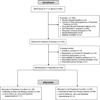The effectiveness of clinician feedback in the treatment of depression in the community mental health system
- PMID: 26052874
- PMCID: PMC4516646
- DOI: 10.1037/a0039302
The effectiveness of clinician feedback in the treatment of depression in the community mental health system
Abstract
Objective: We describe the development and evaluation of a clinician feedback intervention for use in community mental health settings. The Community Clinician Feedback System (CCFS) was developed in collaboration with a community partner to meet the needs of providers working in such community settings.
Method: The CCFS consists of weekly performance feedback to clinicians, as well as a clinical feedback report that assists clinicians with patients who are not progressing as expected. Patients in the randomized sample (N = 100) were predominantly female African Americans, with a mean age of 39 years.
Results: Satisfaction ratings of the CCFS indicate that the system was widely accepted by clinicians and patients. A hierarchical linear models (HLM) analysis comparing rates of change across conditions controlling for baseline gender, age, and racial group indicated a moderate effect in favor of the feedback condition for symptom improvement, t(94) = 2.41, p = .017, d = .50. Thirty-six percent of feedback patients compared with only 13% of patients in the no-feedback condition demonstrated clinically significant change across treatment, χ2(1) = 6.13, p = .013.
Conclusions: These results indicate that our CCFS is acceptable to providers and patients of mental health services and has the potential to improve the effectiveness of services for clinically meaningful depression in the community mental health setting.
(c) 2015 APA, all rights reserved).
Figures



References
-
- Amble I, Gude T, Stubdal S, Andersen BJ, Wampold BE. The effect of implementing the Outcome Questionnaire-45.2 feedback system in Norway: A multisite randomized clinical trial in a naturalistic setting. Psychotherapy Research. 2014;7:1–9. - PubMed
-
- Anker MG, Duncan BL, Sparks JA. Using client feedback to improve couple therapy outcomes: A randomized clinical trial in a naturalistic setting. Journal of Consulting and Clinical Psychology. 2009;77:693–704. - PubMed
-
- Barkham M, Hardy GE, Startup M. The IIP-32: A short version of the Inventory of Interpersonal Problems. British Journal of Clinical Psychology. 1996;35:21–35. - PubMed
-
- Barlow DH, Levitt JT, Bufka LF. The dissemination of empirically supported treatments: A view to the future. Behaviour Research and Therapy. 1999;37:S147–S162. - PubMed
-
- Bryant FB, Smith BD. Refining the architecture of aggression: A measurement model for the Buss–Perry Aggression Questionnaire. Journal of Research in Personality. 2001;35:138–167.
Publication types
MeSH terms
Grants and funding
LinkOut - more resources
Full Text Sources
Other Literature Sources
Medical

